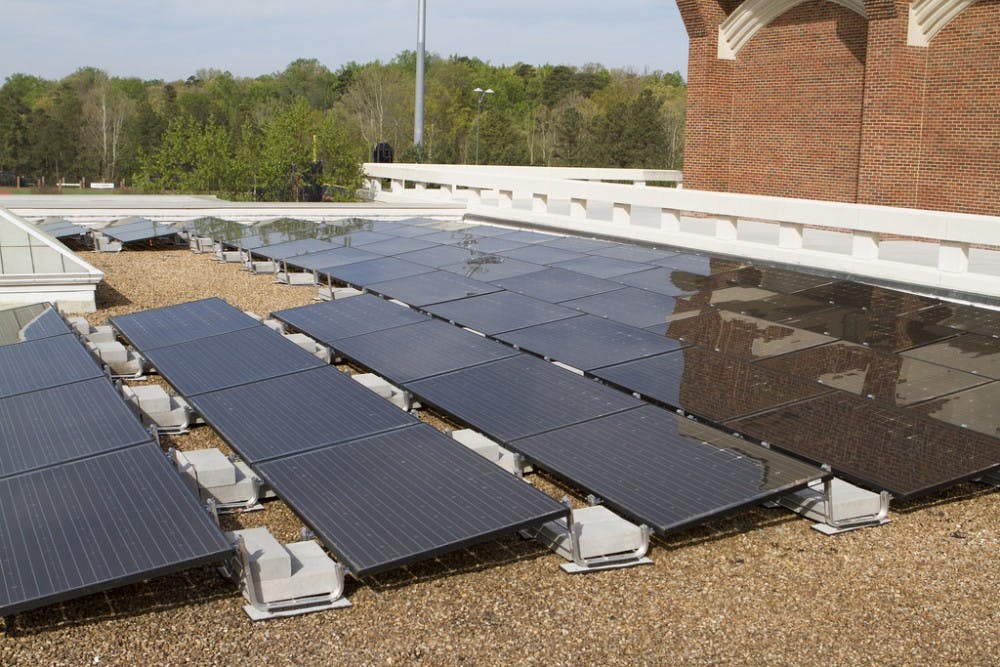University of Richmond was named a "green college" in The Princeton Review’s 2016 publication of "Guide to 361 Green Colleges." This places Richmond among 360 other U.S. colleges and universities recognized for their environmental sustainability initiatives and commitments.
The publication examines data from college surveys across the U.S. about efforts made in improving energy conservation, waste diversion, recycling, sustainability education and access to environmentally-friendly transportation, among other factors, to determine "Green Ratings" on a scale of 60-99.
This adds to Richmond’s list of achievements in its dedication to the environment since 1991.
Earlier this year, the first solar array in Virginia under Virginia’s Power Purchase Agreement (PPA) pilot program that passed legislation in 2013 was installed on the roof of the Weinstein Center. The 205-kilowatt array consists of 749 panels covering 22,000 square feet and is capable of offsetting 364,000 pounds of carbon dioxide.
Richmond was also named a Sierra Club Cool School as well as a top performer on The Association for the Advancement of Sustainability in Higher Education (AASHE)’s 2016 Sustainable Campus Index in Diversity & Affordability this October. AASHE's index was based on last year’s Sustainability Tracking, Assessment and Rating System (STARS) report for Richmond. The Office of Sustainability is currently creating one for this year.
Taking part in the White House’s American Campuses Act on Climate (ACAC) Pledge in 2015, President Ronald Crutcher promised to continue Richmond's efforts towards its Climate Action Plan of 2010 to achieve a 30-percent reduction in its carbon footprint by 2020 and carbon neutrality by 2050.
Rob Andrejewski, director of the Office of Sustainability since last April, said he was optimistic that Richmond could achieve neutrality even before 2050. Using 2008 as a benchmark, he said 17 percent of the progress required had been reported to have already been made between 2010 and 2015.
He stressed the importance of education in regards to sustainability both in and out of class and encouraged more student involvement in Richmond’s various environmental initiatives.
In contrast to the negative effects of having a “carbon footprint," Andrejewski discussed what he called “the student handprint.” Richmond could potentially exceed even carbon neutrality if more student-led involvement occurs, he said.
“Of course carbon neutrality would be highly beneficial, but UR is just one school," Andrejewski said. "It’s the transferable skills and mindsets that the students gain from getting involved with groups like GreenUR and can apply to helping the environment here and in the outside world that are going to have the bigger impact in the long run.”
The university offers various courses and degrees focused on sustainability. Several environmental groups such as GreenUR, Spiders C.A.R.E. and the Food Recovery Network are also active on campus.
Among other plans, the Office of Sustainability is currently focused on Richmond’s recycling processes. The goal is to increase Richmond’s waste diversion rate to 80 percent, meaning only 20 percent of waste would go to landfills while the rest is reused and recycled.
Enjoy what you're reading?
Signup for our newsletter
Andrejewski said that his ultimate goal was to eliminate the concept of waste from Richmond.
“Waste shouldn't exist," he said. "We shouldn’t be violating physics. The second law of thermodynamics states matter cannot be created or destroyed. By wasting, we’re actively destroying matter from our lives and putting them in landfills.”
Contact reporter Arrman Kyaw at arrman.kyaw@richmond.edu
Support independent student media
You can make a tax-deductible donation by clicking the button below, which takes you to our secure PayPal account. The page is set up to receive contributions in whatever amount you designate. We look forward to using the money we raise to further our mission of providing honest and accurate information to students, faculty, staff, alumni and others in the general public.
Donate Now



